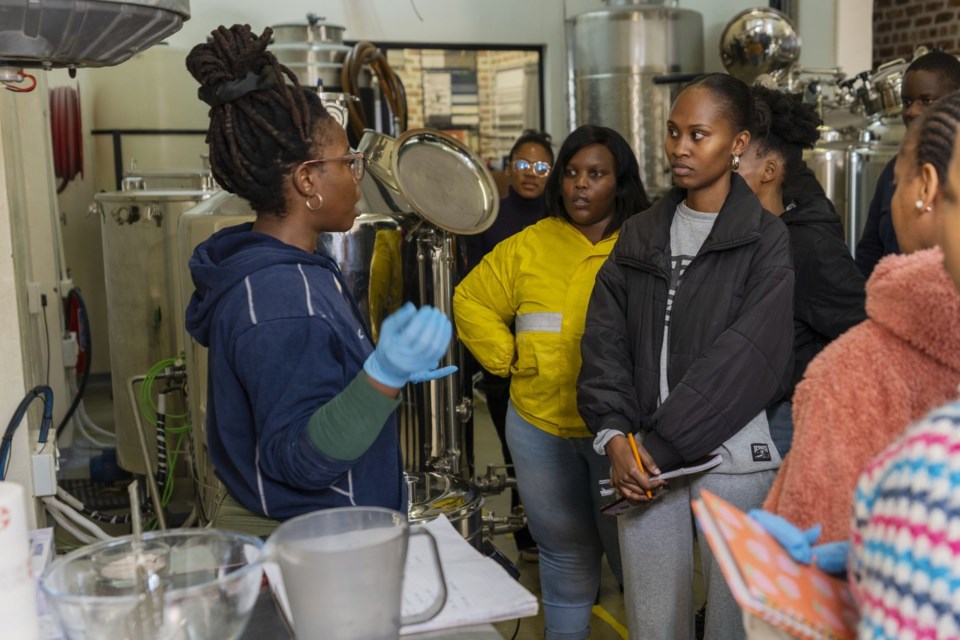JOHANNESBURG (AP) ā After pouring brown, gritty liquid from a huge silver tank into a flute-like container known as a refractometer, South African beer brewing master Apiwe Nxusani-Mawela gives an expert nod of approval and passes it around to her students, who yell their observations with glee.
āWhen you are brewing you must constantly check your mixture,ā Nxusani-Mawela instructs them. āWe are looking for a balance between the sugar and the grains.ā
The 41-year-old Nxusani-Mawela is an international beer judge and taster, and is believed to be the first Black woman in South Africa to own a craft brewery, a breakthrough in a world largely dominated by men and big corporations. Her desire is to open South Africa's multibillion-dollar beer-brewing industry to more Black people and more women.
At her microbrewery in Johannesburg, she's teaching 13 young Black graduates ā most of them women ā the art of beer making.
The science behind brewing
The students at the Brewsters Academy have chemical engineering, biotechnology or analytical chemistry degrees and diplomas, but are eager to get themselves an extra qualification for a possible career in brewing.
Wearing hairnets and armed with barley grains and water, the scientists spend the next six hours on the day's lesson, learning how to malt, mill, mash, lauter, boil, ferment and filter to make the perfect pale ale.
āMy favorite part is the mashing," said Lerato Banda, a 30-year-old chemical engineering student at the University of South Africa who has dreams of owning her own beer or beverage line. She's referring to the process of mixing crushed grains with hot water to release sugars, which will later ferment. "Itās where the beer and everything starts.ā
Nxusani-Mawela's classes began in early June. Students will spend six months exploring beer varieties, both international and African, before another six months on work placement.
Beer is for everyone
Nxusani-Mawela's Tolokazi brewery is in the Johannesburg suburb of Wynberg, wedged between the poor Black township of Alexandra on one side and the glitzy financial district of Sandton ā known as Africa's richest square mile ā on the other.
She hails from the rural town of Butterworth, some 1,000 kilometers (621 miles) away, and first came across the idea of a career in beer at a university open day in Johannesburg. She started brewing as an amateur in 2007. She has a microbiology degree and sees beer making as a good option for those with a science background.
āI sort of fell in love with the combination of the business side with the science, with the craftsmanship and the artistic element of brewing,ā she said.
For the mother of two boys, beer brewing is also ripe for a shakeup.
āI wanted to make sure that being the first Black female to own a brewery in South Africa, that Iām not the first and the last,ā she said. āBrewsters Academy for me is about transforming the industry ... What I want to see is that in five, 10 years from now that it should be a norm to have Black people in the industry, it should be a norm to have females in the industry."
South Africa's beer industry supports more than 200,000 jobs and contributes $5.2 billion to South Africaās gross domestic product, according to the most current Oxford Economics research in āBeerās Global Economic Footprint.ā While South Africa's brewing sector remains male-dominated, like most places, efforts are underway to include more women.
One young woman at the classes, 24-year-old Lehlohonolo Makhethe, noted women were historically responsible for brewing beer in some African cultures, and she sees learning the skill as reclaiming a traditional role.
"How it got male dominated, I donāt know,ā Makhethe said. āIād rather say we are going back to our roots as women to doing what we started.ā
With an African flavor
While Nxusani-Mawela teaches all kinds of styles, she also is on a mission to keep alive traditional African beer for the next generation. Her Wild African Soul beer, a collaboration with craft beer company Soul Barrel Brewing, was the 2025 African Beer Cup champion. It's a blend of African Umqombothi beer ā a creamy brew incorporating maize and sorghum malt ā with a fruity, fizzy Belgian Saison beer.
āUmqombothi is our African way, and everybody should know how to make it, but we donāt,ā she said. āI believe that the beer styles that we make need to reflect having an element of our past being brought into the future.ā
She's used all sorts of uniquely African flavors in her Tolokazi line, including the marula fruit and the rooibos bush that's native to South Africa and better-known for being used in a popular caffeine-free tea.
āWho could have thought of rooibos beer?ā said Lethabo Seipei Kekae after trying the beer for the first time at a beer festival. āItās so smooth. Even if you are not a beer drinker, you can drink it.ā
___
AP Africa news:
Michelle Gumede, The Associated Press



